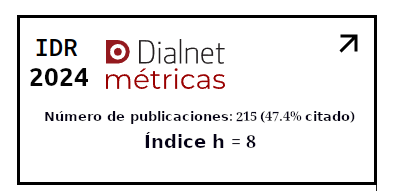Adaptation and validation of the social media engagement questionnaire to Spanish language
Keywords:
Redes sociales; cuestionario; adaptación; validaciónAbstract
Lately, the study of digital or mediated interaction by modern communication technologies has been increasing, giving rise to the posing of new problems to address and study. As in any kind of interaction, the digital one has positive and negative aspects, which is of current interest for the Social Sciences. Actually, there are few articles, particularly in Latin America, about how digital interaction affects these ways of socialization and how much time we spend in social networking. The Social Media Engagement Questionnaire (SMEQ) is one of the main techniques to effectively measure how immersed in social networks sites we are, taking as a reference the frequency of online connection over the course of a week. The purpose of this article is to adapt and validate the scale to the Argentinean context in a sample of 418(four hundred eighteen) middle level students residing in the Ciudad Autónoma de Buenos Aires (CABA), Argentina. The results obtained by confirmatory factorial analysis offer empirical support to the dimensional model, contributing to the adaptation and validation of the inventory for the argentinean context.
Downloads
References
Alt, D. (2015). College students’ academic motivation, media engagement and fear of missing out. Computers in Human Behavior, 49. doi: 10.1016/j.chb.2015.02.057.
Apaolaza, V., Hartmann, P., D'Souza, C., y Gilsanz, A. (2019). Mindfulness, compulsive mobile social media use, and derived stress: The mediating roles of self-esteem and social anxiety. Cyberpsychology, Behavior, and Social Networking, 388-396. http://doi.org/10.1089/cyber.2018.0681.
Baker, Z., Krieger, H., y LeRoy, A. (2016). Fear of missing out: Relationships with depression, mindfulness, and physical symptoms. Translational Issues in Psychological Science, 2, 275-282. doi: 10.1037/tps0000075.
Bentler, P. M. (1990). Comparative fit indexes in structural models. Psychological Bulletin, 107(2), 238-246. https://doi.org/10.1037/0033-2909.107.2.238.
Cangur, S., & Ercan, I. (2015). Comparison of Model Fit Indices Used in Structural Equation Modeling Under Multivariate Normality. Journal of Modern Applied Statistical Methods, 14(1), 152–167. https://doi.org/10.22237/jmasm/1430453580.
Dominguez-Lara, S. (2018). Fiabilidad y alfa ordinal. Actas Urologicas Espanolas, 42(2), 140-141. https://doi.org/10.1016/j.acuro.2017.07.002.
Heo, M., Kim, N., y Faith, M.S. (2015). Statistical power as a function of Cronbach alpha of instrument questionnaire items. BMC Med Res Methodol, 15, 86. https://doi.org/10.1186/s12874-015-0070-6.
Holgado-Tello, F. P., Chacón-Moscoso, S., Barbero-García, I., y Vila-Abad, E. (2009). Polychoric versus Pearson correlations in exploratory and confirmatory factor analysis of ordinal variables. Quality and Quantity, 44, 153–166. doi:10.1007/s11135-008-9190.
Hu, L., y Bentler, P. M. (1999). Cutoff criteria for fit indexes in covariance structure analysis: Conventional criteria versus new alternatives. Structural Equation Modeling: A Multidisciplinary Journal, 6(1), 1-55. https://doi.org/10.1080/10705519909540118.
Kline, R. B. (2005). Structural equation modeling. New York, NY: The Guilford Press.
Kline, R. B. (2010). Principles and practice of structural equation modeling. New York, NY: The Guilford Press.
Koller, I., Levenson, M. R., y Glück, J. (2017). What do you think you are measuring? A mixed-methods procedure for assessing the content validity of test items and theory-based scaling. Frontiers in Psychology, 8 (February). https://doi.org/10.3389/fpsyg.2017.00126.
Kosinski, M., Matz, S. C., Gosling, S. D., Popov, V., y Stillwell, D. (2015). Facebook as a research tool for the social sciences: Opportunities, challenges, ethical considerations, and practical guidelines. American Psychologist, 70(6), 543-556. https://doi.org/10.1037/a0039210.
Lacobucci, D. (2010). Structural equations modeling: Fit indices, sample size, and advanced topics. Journal of Consumer Psychology, 20(1), 90-98. doi: 10.1016/j.jcps.2009.09.003.
Lee, S., Choun, S., Aldwin, C. M., y Levenson, M. R. (2015). Cross-Cultural Comparison of Self-Transcendent Wisdom Between the United States and Korea. Journal of Cross-Cultural Gerontology, 30(2), 143-161. https://doi.org/10.1007/s10823-015-9259-8.
Liu, C. y Ma, J (2018). Social media addiction and burnout: The mediating roles of envy and social media use anxiety. Curr Psychol. https://doi.org/10.1007/s12144-018-9998-0.
Muñiz, J., Elosua, P., y Hambleton, R. K. (2013). Directrices para la traducción y adaptación de los tests: Segunda edición. Psicothema, 25, 151-157. doi:10.7334/psicothema2013.24
Przybylski, A. K., Murayama, K., DeHaan, C. R., & Gladwell, V. (2013). Computers in Human Behaviour: Motivational, emotional, and behavioral correlates of fear of missing out. Elsevier: Computers in Human Behaviour, 29, 1841-1848.
Reer, F., Tang, W. Y., y Quandt, T. (2019). Psychosocial well-being and social media engagement: The mediating roles of social comparison orientation and fear of missing out. New Media & Society,21(7):1486-1505. doi:10.1177/1461444818823719.
Schermelleh-Engel, K., Moosbrugger, H., y Müller, H. (2003). Evaluating the fit of structural equation models: Tests of significance and descriptive goodness-of-fit measures. Methods of Psychological Research Online, 8(2), 23-74.
Shaver, L. G., Khawer, A., Yi, Y., Aubrey-Bassler, K., Etchegary, H., Roebothan, B., ... y Wang, P. P. (2019). Using facebook advertising to recruit representative samples: feasibility assessment of a cross-sectional survey. Journal of medical Internet Research, 21(8), e14021.
Stier, S., Breuer, J., Siegers, P., y Thorson, K. (2019). Integrating survey data and digital trace data: key issues in developing an emerging field. Social Science Computer Review, 38(5), 503-516. https://doi.org/10.1177/0894439319843669
Swar, B., y Tahid, H. (2017). Fear of missing out, social media engagement, smartphone addiction and distraction: moderating role of self-help mobile apps-based interventions in the youth. 10th International Conference on Health Informatics At: Porto, Portugal. doi: 10.5220/0006166501390146.
Ventura León, J. L., y Caycho Rodríguez, T. (2017). El coeficiente Omega: Un método alternativo para la estimación de la confiabilidad. Revista Latinoamericana de Ciencias Sociales, Niñez y Juventud, 15(1), 625–627.
Published
How to Cite
Issue
Section
License
Copyright (c) 2021 ACADEMO Revista de Investigación en Ciencias Sociales y Humanidades

This work is licensed under a Creative Commons Attribution 4.0 International License.








